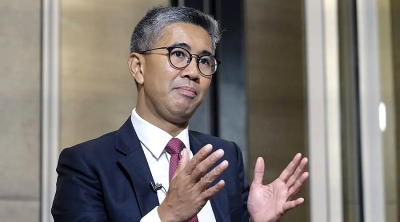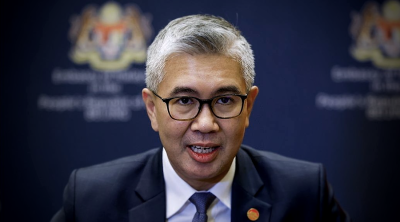
We have entered the last quarter of 2022 which, by various data points, will go down in history as Malaysia’s “turnaround year”, after two years of debilitating economic hardship brought about by the pandemic.
We have had three consecutive quarters of economic growth: 3.6% in 4Q2021, followed by 5.0% in 1Q2022 and 8.9% in 2Q2022.
Unemployment in July this year was 3.7%, a significant decrease from the peak of 5.3% in May 2020. Our trade for the second quarter of this year was at a record high of RM1.35 trillion and we are on track to land at the upper range of the 5.3% – 6.3% GDP growth forecast for 2022.
These are all clear, encouraging signs of the economic recovery that we had worked so hard towards.
The Government’s policy responses, coupled with the effort of various sectors in Malaysia, have enabled our people to successfully rebound post-pandemic.
But now we must temper our optimism with a dose of realism, as well as prepare our nation and its people for an imminent global economic slowdown in 2023, which will affect small trading nations like us.
The historic rate hikes by the US Federal Reserve to cap its domestic global inflation, is also meant to decelerate its economy, whose repercussions has, no doubt, been felt the world over, including in Malaysia.
These drastic rates hikes have contributed to a stronger US Dollar, affecting most nations trading mainly in US Dollar, although global inflation has played a much bigger role in driving up prices compared to the stronger US dollar.
Further, it doesn’t help that the war in Ukraine has dragged on far longer than expected, with disrupted global supply chains affecting millions, causing higher prices due to more demand chasing less supply.
Perhaps there is also a need to question the root cause of the world’s current problems. Have we over-sold the concept of globalization, with its attendant huge carbon footprint as supply chains chase the lowest cost producers a few continents away? Why is the whole world relying on one single reserve currency? Is de-globalization the next mega-trend, as more and more countries focus on becoming self-sufficient, especially on food and energy security for their people’s well-being?
Perhaps Asia needs to consider a new world order to safeguard the interest of its 4.7-billion population.
In the meantime, how do we prepare Malaysians for future volatility? How can we build resilience fast?
Since 2020, I have been advocating the long-term view even while being responsive to short-term needs. MOF’s Responsive, Responsible and Reformist policy-making approach is more important now than ever, particularly in preparing the people and businesses for an imminent global economic slowdown, and an increasing inclination towards de-globalization by countries such as China, India and the US.
How can our corporates help Malaysia build resilience in its people when major powers are fast de-globalizing? This is where our whole-of-nation approach will be more crucial than ever.
How corporates can help build domestic resilience
We must strengthen ourselves internally. One way is to incorporate ESG principles in the Government and GLIC ecosystem.
But while that supports our longer-term objectives, I feel there are some low-hanging fruit that corporates and market players can leverage on to help the country, but note that the list I am sharing is non-exhaustive.
First, companies could and should spend as much of their earnings as possible within the country, and this may entail redesigning their supply chains to incorporate more locally produced inputs.
Corporates could also help empower small businesses by incorporating them into their supply chains, instead of relegating them to the CSR pillar.
Second, enhancing social safety nets and improving social protection should not rest solely with the government.
A social safety net program is best complemented by financial literacy, which corporates can take on to educate and elevate the communities in which they operate.
Incidentally, we have just entered October, which is the designated financial literacy month by Malaysia’s financial industry.
Third, corporates and GLICs should also play their role in attracting high-quality investments and creating higher-paying jobs.
With China’s zero-COVID policies, many investors from various countries have expressed interest to relocate to Malaysia, something public-private partnerships could certainly work on.
Fourth, those in the tourism sector could further encourage and promote domestic tourism. In fact, we still have not fully utilized some of the Budget 2022 allocations meant for the tourism sector.
The sector must also intensify cross-industry collaboration, such as with the medical industry to boost quality medical tourism.
Fifth, bigger corporates must also assist smaller companies – particularly those within their ecosystem – to achieve their ESG goals.
While the Government has taken various steps to embrace ESG in many of its operations, the corporate sector, especially big businesses must also play their part in encouraging their customers, suppliers and vendors to operationalize ESG considerations.
Small (disciplined) steps that will reap big dividends
I am not at liberty to share what measures will be included in Budget 2023, but what I can say is that discipline is a key theme in next year’s budget, particularly as we prepare ourselves for the tougher year ahead.
To that end, apart from the proposed tabling the Fiscal Responsibility Act at year-end, it would also help for our people and businesses to instill a more disciplined mindset.
The analogy I would like to share is when I went from 85kg to my current 70-kg frame several years ago, by starting to run and eat less. Instead of cutting down on rice by 50% in one go (way too daunting!), I reduced it by 10% each week. Eventually, I reached my target weight within just two months!
I feel that this is how we should approach our subsidy rationalization – gradually, but with determination and discipline – to achieve future fiscal resilience. Why do we need this?
Let’s go back to our RM80-billion blanket subsidy bill this year. If we channeled our subsidies only to those who truly deserve it, and could save, say RM30 billion, how many schools, hospitals, and better public transport can we finance for the masses?
The logic is simple: those who can afford it must pay market prices. And while it was the Government’s responsibility to care for its people and businesses during the pandemic, today all economic and social sectors have re-opened and we are no longer in pandemic mode.
Through our RM21-billion wage subsidy, for example, we have helped 358,000 businesses and 2.96 million workers get back on their feet. It is time they continued the journey without further hand-holding by the Government.
The Government will always do its utmost to safeguard the rakyat against short and long-term challenges, but this is a tough balancing act when global slowdown is imminent.
So, we really need just a bit of discipline by everyone in Keluarga Malaysia but we must start now to help us get through the tough times ahead, and to secure a more resilient future for ourselves and our children.
(Tengku Zafrul bin Tengku Abdul Aziz is the Minister of Finance, Malaysia.)
ADVERTISEMENT
ADVERTISEMENT






































